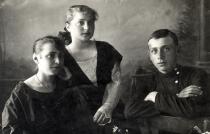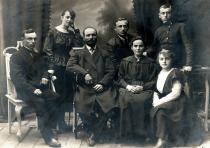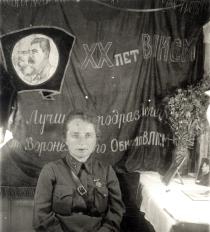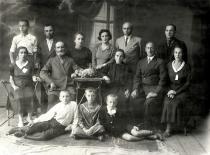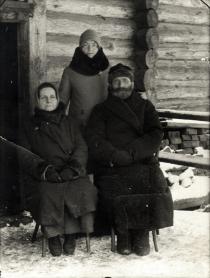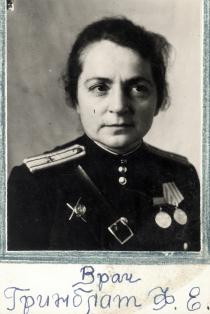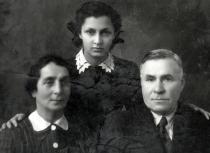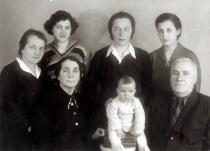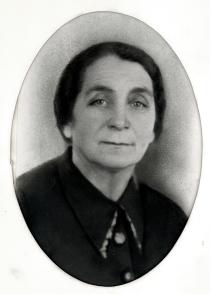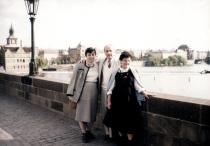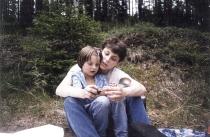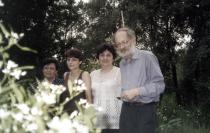This is me, standing with grandfather and grandmother.
We lived together since my birth. I am 13 years old. Mother lived in Leningrad at that time already. The picture was taken in evacuation in Alma-Ata in 1947.
Gitl Khaimovna Grienblatt, my grandmother, was born in 1893. Grandmother's parents were religious people and lived in Orsha almost all their lives. In 1910 grandmother Gitl married my grandfather.
My maternal grandfather, Berko Shaposhnik was born in 1881. He also came from Belarus, they were distant relatives with grandmother. My grandparents both studied in Jewish religious school. They spoke mostly Yiddish with each other.
Later grandmother learnt Russian rather well, spoke without accent and could write rather correctly. Grandfather spoke Russian with a borough accent till the end of his life and often used grammar cases incorrectly.
They moved to Kiev from Orsha in approximately 1910. Grandfather was a qualified tailor and grandmother was a housewife. Their family was not religious, they did not observe any traditions and did not perform any ceremonies.
In his youth grandfather was a member of Bund, a social-democratic organization, which consisted mostly of Jews-craftsmen. During the first years of the Soviet power he was once even elected delegate in the Municipal Council. Financially, though, they were an average family.
My grandparents had two children: Eidel Shaposhnik, my mother, (1912 - 1975) and her younger brother Miron (1918-1998). Uncle Miron lived in Kiev, and then also in Biysk (Siberia) and in Moscow. He was an economist and married a Russian woman.
My mother married father in Kiev in 1933. I was born in Kiev in 1934. We lived together with my maternal grandparents and my uncle Miron. Besides, my great grandmother, mother of grandfather Berko, lived with us too.
Our whole family was not religious, we all wore common clothes, grandfather did not wear payot or kipa, we did not observe the ceremonies or attend the synagogue. Since grandparents often spoke Yiddish to each other, I understood Yiddish and still do, though I never spoke it.
Grandfather worked as a cutter at that time in a tailoring atelier, mother was a controller in a Savings bank department and father worked as an engineer at the Municipal Water Supply Station. Grandmother Gitl kept the house.
When the Great Patriotic War broke out, grandparents evacuted with the rest of our family. Only my father and maternal great grandmother stayed in Kiev (father’s duty was to blow up the Kiev Water Supply Station, if the Germans came; and great grandmother was very old then and did not leave the house).
They perished in Kiev: the Germans executed them all by shooting in Babi Yar [a gully in the north-western suburbs of Kiev, a place of mass massacre of peaceful citizens (mostly Jews) by German occupants and prisoners-of-war during 1941-1943.
In total 100,000 people were destroyed in Babi Yar]. After a very long travel we finally reached the town of Alma-Ata, capital of Kazakhstan, where we lived until the end of the war.
After the war ended in 1945, my mother went to Leningrad where grandmother Gitl’s younger sister, aunt Fanya lived. Grandmother Gitl, grandfather and me came to Leningrad from Alma-Ata only several years later, after mother and aunt Feiga managed with great difficulty to obtain bigger space for us in another communal apartment.
Grandmother helped with the household until the end of her life. She died in 1965. Grandfather worked as a cutter in an atelier in Leningrad and also did some additional work at home.
However, his sight began to worsen, he started to spoil orders and we prohibited for him to work. He could not do without working and tried to go to the library and help about the house.
He lived a long life and died in 1974. All my relatives are buried in the so-called Jewish ground at the Yuzhnoye (Southern) cemetery in Leningrad - though they were not religious people, as most of the Jews in Soviet time.

